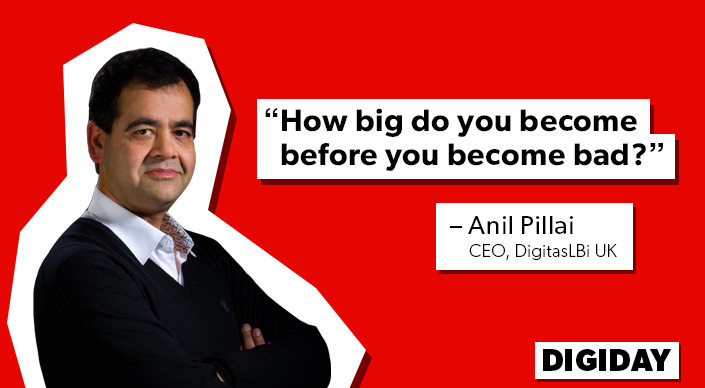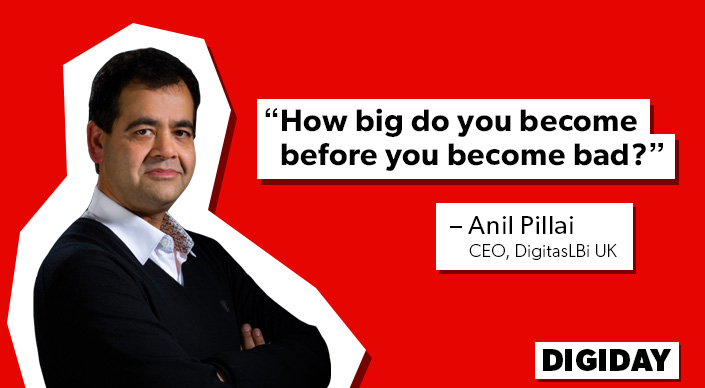Secure your place at the Digiday Media Buying Summit in Nashville, March 2-4

This is “View from the Top,” the latest in a Digiday series featuring creative leaders talking about their career paths and leadership perspectives. Read previous interviews here.
Anil Pillai has been doing digital work ever since its potential for advertisers became apparent, but his career path could have been quite different. Pillai became an expert in Bollywood and Madonna during his time at Cambridge University. However, after graduating in 1996, Pillai quickly realized that a career as a pop historian wasn’t for him. Instead, he joined one of the first interactive agencies in London, Oyster Partners.
Oyster eventually merged with LBi, which was long considered a pioneer of a radically different kind of agency, one that competed with Sapient Nitro and AKQA. Pillai stuck with the agency through that time, serving as client partner and managing director and helping it get acquired by Publicis Groupe. LBi was subsequently merged with Digitas in 2013 — a network where Pillai now serves as U.K. CEO.
Longevity at a single agency is rare in an industry where staff turnover is very high. But with new competitive threats in digital popping up all the time, staying power is a good trait to have. Pillai’s loyalty has been rewarded with an expanded remit. He’s overseeing the integration of African digital agency Liquorice and DigitasLBi’s new office in Dubai.
Pillai discussed with Digiday the new types of competition he’s seeing and what he thinks helps differentiate his agency. Excerpts:
How do you feel about new kinds of competition from management consultancies and other kinds of agencies?
It’s fine. Maybe it makes us check our rear-view mirror a little, but, most importantly, we’ve just got to stick to our vision. Clearly, there’s new competition. I hear there are 70 people writing code and working on [Adobe] CQ5 at Accenture now. They weren’t doing that five or 10 years ago. But there’s no creative soul there. You can’t buy that. It’s either in your company’s culture and DNA, or it isn’t.
On the other side, you now have everyone in adland now saying they do digital. But then they’ve often only got two techies. When we started this agency I hired a CTO and put engineering at our core. Now we’ve got 180 engineers. We’ve handled attacks by Anonymous and other denial of service attacks. We’re doing proper Blade Runner stuff.
Was that distinction what led to DigitasLBi leaving the U.K.’s main advertising trade group, the Institute of Practitioners in Advertising?
We moved out of the IPA because we were ending up running all of their digital training courses. I just thought, are we really here to tell everyone the world has changed and they have to be changing? Ultimately, we weren’t learning or gaining anything. The IPA are very good at classic account management and classic strategy, but I’ve got enough people that can help me with that here.
I wanted us to be learning from a Hyper Island-type environment instead. So, we’re creating our own sort-of boot camp. We’ve done partnerships with Decoded and Hyper Island and others in the past and I reckon we’re creating one of the best universities for digital in the country.
How do you feel about one of your closest competitors, Sapient Nitro, joining Publicis Groupe?
I’ve enjoyed competing against Nigel [Vaz’s] team. So it is a whole thing for us to rethink. To use a football analogy: Imagine you’re Manchester City and suddenly you’re told you’re now part of Manchester United. Figure that one out! The way [Sapient] is connected into the group and how that’s orchestrated by Maurice [Levy] will be very interesting.
Aside from the competition, what else gives you reason to worry?
The question I think about is: How big do you become before you become bad? How do I make sure that, as [the agency becomes] bigger, it’s more of a strength and that it has more soul, not less? That’s the way I’m trying to build. That is the challenge.

On a more personal note, do you ever get sick of working with technology?
I do think our generation and the one above get a little bit freaked out with how much things have changed. But the ones below us don’t so much. I like doing some things in analogue. I love physical books, I make people write me a paper letter every year, we have a blackboard in reception. We have to force analogue methods on people sometimes to keep us connected to the real world.
I suppose your dissertation on Madonna would have been easier if you’d had access to today’s Web.
Oh man. Could you imagine? Tinder and the like. Excuse me! Imagine all that dead time people used to have and what’s now going on today instead. It was wild enough as it was. I’m not sure anyone would have got a degree if we’d had today’s Web back then.
More in Marketing

Thrive Market’s Amina Pasha believes brands that focus on trust will win in an AI-first world
Amina Pasha, CMO at Thrive Market, believes building trust can help brands differentiate themselves.

Despite flight to fame, celeb talent isn’t as sure a bet as CMOs think
Brands are leaning more heavily on celebrity talent in advertising. Marketers see guaranteed wins in working with big names, but there are hidden risks.

With AI backlash building, marketers reconsider their approach
With AI hype giving way to skepticism, advertisers are reassessing how the technology fits into their workflows and brand positioning.





